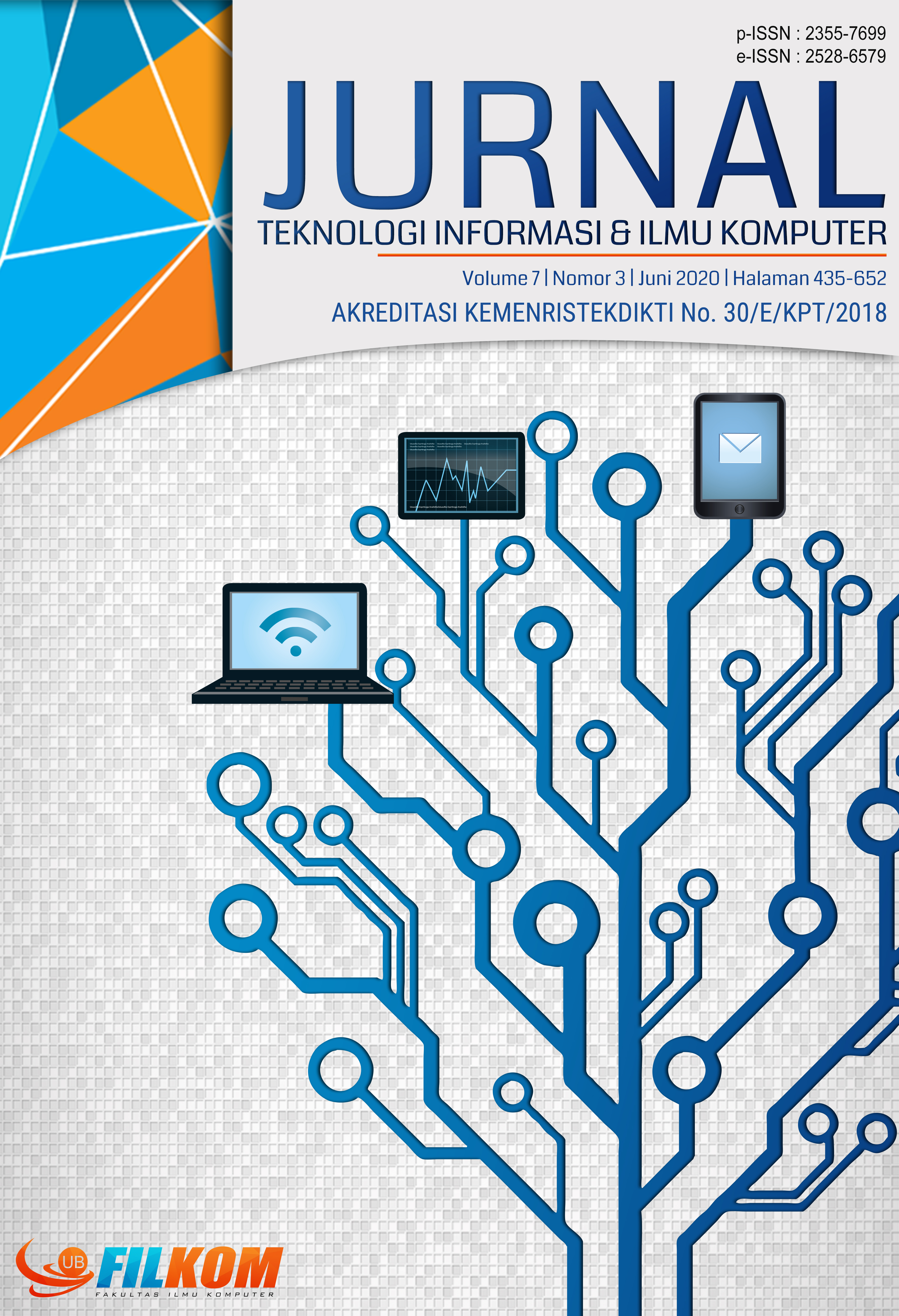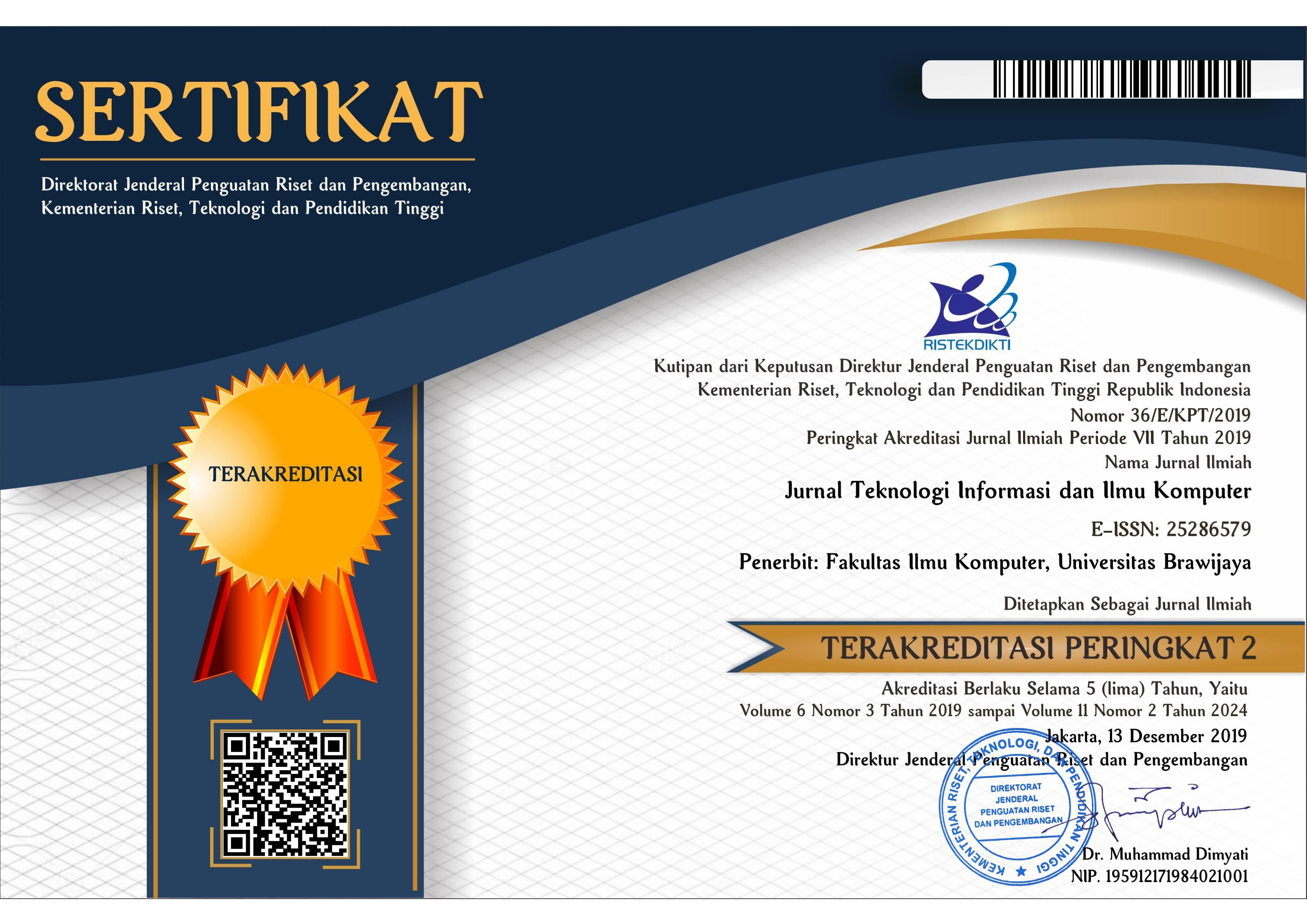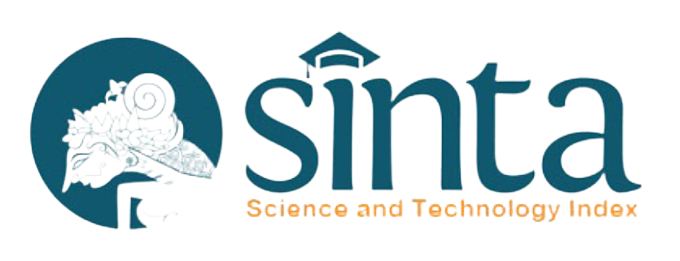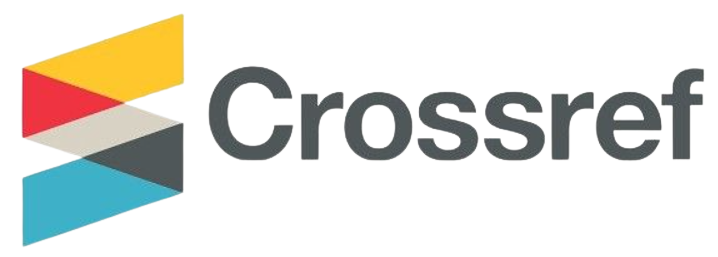Analisis Sentimen Maskapai Penerbangan Menggunakan Metode Naive Bayes dan Seleksi Fitur Information Gain
DOI:
https://doi.org/10.25126/jtiik.2020711947Abstrak
Zaman sekarang tren masyarakat untuk memesan tiket pesawat sudah melalui situs-situs booking online. Pegipegi.com merupakan salah satu website yang menyediakan pemesanan tiket dan menyediakan fitur ulasan bagi pengunjung untuk menyampaikan opini. Pengunjung lain yang membaca ulasan-ulasan tersebut dapat memperoleh gambaran secara lebih objektif mengenai maskapai penerbangan. Ulasan pengguna yang terdapat pada website pegipegi.com saat ini sudah sangat banyak sehingga hal ini menyulitkan dan memakan waktu untuk membaca secara keseluruhan. Oleh karena itu dirancang analisis sentimen guna membantu mengklasifikasi ulasan kedalam kategori positif atau negatif sehingga dapat memberikan rekomendasi maskapai penerbangan berdasarkan jumlah kategori ulasan. Metode yang diterapkan untuk klasifikasi sentimen adalah Naïve Bayes dengan seleksi fitur Information Gain. Adapun tujuan dari penelitian ini adalah mengetahui pengaruh dari pemilihan fitur Information Gain terhadap akurasi klasifikasi dan membuktikan bahwa metode Naïve Bayes dengan Information Gain dapat digunakan untuk klasifikasi analisis sentimen. Hasil pengujian yang telah dilakukan menunjukkan bahwa nilai rata-rata akurasi, precision, recall setelah penambahan Information Gain menunjukkan hasil yang lebih baik sebesar 0,865 jika dibandingkan sebelum penambahan information gain yakni sebesar 0,81.
Abstract
Nowadays people tend to order airplane tickets through online booking sites. Pegipegi.com is a website that provides ticket reservations and a review section for visitors to express their opinions. Other visitors who read the reviews can get a more objective picture of airlines. The user reviews contained on the pegipegi.com website are currently very large so this makes it difficult and time consuming to read in its entirety. Therefore sentiment analysis is designed to help classify reviews into positive or negative categories so that they can provide airline recommendations based on the number of review categories. The method applied for sentiment classification is Naïve Bayes with the Information Gain feature selection. The purpose of this study was to determine the effect of selecting the Information Gain feature on classification accuracy and prove that the Naïve Bayes method with Information Gain can be used for the classification of sentiment analysis. The results of the tests that have been done show that the average value of accuracy, precision, recall after adding Information Gain shows better results of 0.865 compared to the addition of information gain which is equal to 0.81.
Downloads
Referensi
AGUSTA, L. (2009). Perbandingan Algoritma Stemming Porter dengan Algoritma Nazief & Adriani untuk Stemming Dokumen Teks Bahasa Indonesia. Proceeding Konferensi Nasional Sistem dan Informatika. Yogyakarta, 196-201
BASARI, A., HUSSIN, B., & ANANTA, I. (2013). Opinion Mining of Movie Review Using Hybrid Method of Support Vector Machine and Particle Swarm Optimization.
CHANDANI, V. W. (2015). Komparasi Algoritma Klasifikasi Machine Learning dan Feature. Journal of Intelligent System.
CHEN, J., HUANG, H., TIAN , S., & QU, Y. (2009). Feature selection for text clasification with Naive Bayes. Expert System with Applications, 5432-5435.
FELDMAN, R. (2013). Techiques and applications for sentiment analysis. Communications of the ACM, 56(4), 82.
HADDI, E., LIU, X., & SHI, Y. (2013). The Role of Text Pre-processing in sentiment Analysis. Procedia Computer Science, 17, 26-32.
RADITYATAMA, A. K. (2014). Pengaruh Atribut Merek Daring Pada Citra Merek Perusahaan Daring. Jurnal Ekonomika dan Bisnis. Yogyakarta: Universitas Gadjah Mada.
TULILI, T. R., & ANDRIJASA, M. F. (2018). Sentiment Classification of Microblogging in Indonesia Airlines Services using Support Vector Machine.
UYSAL, A., & GUNAL, S. (2012). A Novel probobilistic feature selection method for text clasification . Knowledge-Based System, 36, 226-235.
WANG, S. L. (2011). A feature selection method based on improved fisher’s discriminant ratio for text sentiment classification, Expert Systems with Applications,38 (7), 8696-8702.
ZAFIKRI, A. (2010). Implementasi Metode Term Frequency Inverse Document Frequency (TF-IDF) Pada Sistem Temu Kembali Informasi. Skripsi. Universitas Sumatera Utara.
ZHANG ZIQIONG, YE, Q., & LAW, R. (2009). Expert System with Sentiment clasification ofonline reviews to travel destinations by supervised machine learning approaches. Expert Systems With Applications, 36(3), 6527-6535.
ZHANG, Z., Ye, Q., Zhang, Z., & Li, Y. (2011). Sentiment classification of Internet Restaurant Reviews Written in Cantonese. Expert with Application. 38(6), 7674–7682.
Unduhan
Diterbitkan
Terbitan
Bagian
Lisensi

Artikel ini berlisensi Creative Common Attribution-ShareAlike 4.0 International (CC BY-SA 4.0)
Penulis yang menerbitkan di jurnal ini menyetujui ketentuan berikut:
- Penulis menyimpan hak cipta dan memberikan jurnal hak penerbitan pertama naskah secara simultan dengan lisensi di bawah Creative Common Attribution-ShareAlike 4.0 International (CC BY-SA 4.0) yang mengizinkan orang lain untuk berbagi pekerjaan dengan sebuah pernyataan kepenulisan pekerjaan dan penerbitan awal di jurnal ini.
- Penulis bisa memasukkan ke dalam penyusunan kontraktual tambahan terpisah untuk distribusi non ekslusif versi kaya terbitan jurnal (contoh: mempostingnya ke repositori institusional atau menerbitkannya dalam sebuah buku), dengan pengakuan penerbitan awalnya di jurnal ini.
- Penulis diizinkan dan didorong untuk mem-posting karya mereka online (contoh: di repositori institusional atau di website mereka) sebelum dan selama proses penyerahan, karena dapat mengarahkan ke pertukaran produktif, seperti halnya sitiran yang lebih awal dan lebih hebat dari karya yang diterbitkan. (Lihat Efek Akses Terbuka).














